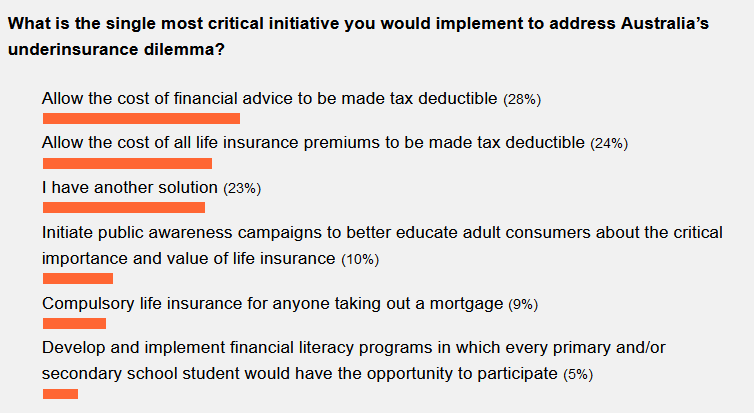Renowned risk specialist, Russell Collins, provides his own perspective on Australia’s underinsurance dilemma.
Responding to Riskinfo publisher, Peter Sobels, in relation to a poll addressing underinsurance, Russell takes a step back to reflect on the nature of an unresolved issue that has been present in our community for decades prior to the implementation of recent regulatory mandates such as the LIF and FASEA reforms.
Peter, in our recent correspondence you mentioned to me about this underinsurance problem survey. Looking at the options I would have voted for “I have another solution”*. Each of the current options are really “external” to the advisory area. I think the problem rests within the advisory area, that is, why isn’t more life insurance being sold?
…many advisers see [life insurance] as a product to be sold rather than an opportunity to build long-term relationships with clients…
With my 40+ years of association with the industry as an adviser and mentor I really believe that one of the major reasons for this problem relates to the current advisers’ lack of belief in both the product and the benefit that life insurance plays in people’s lives. Life insurance is the only product that can change expectations into certainties and promises into guarantees! In other words, many advisers see it as a product to be sold rather than an opportunity to build long-term relationships with clients who care about protecting families and/or business, in the event of their dying too soon.
People buy what they understand…
Underlining this lack of passion is the training programs for newer, and not so new, advisers in the industry. There is major emphasis on product knowledge and technical skills and an under emphasis on communication skills. Advisers are more educators than they are salespeople, and their education starts with their own self-education in communication skills. People buy what they understand, and they don’t buy what they don’t understand!
Over the years I have observed two major reasons for many financial advisers not being involved in the risk insurance area. First, they’re still stuck in a time tunnel where ‘selling’ (life insurance) is very unprofessional, i.e. if you sell for a living you wouldn’t be regarded as professional, but if you want to be regarded as professional, then you wouldn’t sell for a living! In other words, ‘selling’ and ‘professionalism’ are mutually exclusive. Yet these very same advisers spend every minute of their day ‘selling’ their advice to prospects and clients!
Second, and probably more valid, is that it takes too long to get a case completed and, if it’s declined during underwriting, then their time has been wasted (unless they have charged some form of preparation fee). But, again, the latter advisers have not been taught how to process their cases through underwriting so that they have the opportunity to educate the underwriters and discuss proposed adverse decisions with them, before the final decision is made. And if the final decision made is one that includes a premium loading, they don’t know how to sell the loading to the prospect/client with success. Again, this is all related to communication skills.
People don’t buy life insurance because they’re going to die, they buy life insurance in order that others might live…
Selling life insurance is not a job – it’s a vocation! Advisers who specialise in this area get the opportunity to leave home every single day, knowing that they can make a difference in the financial lives of the people with whom they come in contact that day. Every time I delivered a death claim or disability claim cheque, I knew that I made a financial difference in the lives of the people or businesses that were the recipients of those cheques. This added meaning and value to my life and provided dignity, financial stability and independence to the recipients of those cheques. Left to themselves these people would not have instigated the process of purchasing these policies. I approached them. I took the initiative to convince them of the need to meet with me to hear how I could help them. People don’t buy life insurance because they’re going to die, they buy life insurance in order that others might live. Therefore, it’s a character purchase! These people are going to pay premiums for years knowing that they will never witness the legacy they have provided.
As long as love and a sense of obligation continue to exist in abundance in our society, there will always be a need for life insurance and life insurance advisers.
*Russell’s ‘I have another solution’ reply is in response to a recent Riskinfo poll which asked advisers to identify the most important initiative that would address underinsurance in Australia:
 Russell Collins is a life insurance advice specialist who has been advising clients or mentoring other advisers for more than forty years. Russell presently mentors today’s advisers via his Risk Insurance Communication Skills (RICS) consulting firm.
Russell Collins is a life insurance advice specialist who has been advising clients or mentoring other advisers for more than forty years. Russell presently mentors today’s advisers via his Risk Insurance Communication Skills (RICS) consulting firm.









After 40 years of doing this job pretty well and quite successfully, I have moved from thinking I would keep going until old age caught up with me to now avoiding writing new business for 3 primary reasons. 1) The compliance burden is absurd and the majority of it is of no benefit to anyone except those in the compliance industry. I spend more time justifying my actions to compliance experts than I do writing the business. A recently case in which I cancelled and replaced the same Life product with the same company and same sum assured but negotiated an $8,000 ongoing premium savings was failed in my audit because I ‘failed to prove I had acted in the client’s best interest’. And the SoA for this case was 35+ pages long! I also got into trouble for not going through the clients other possible areas of need like TPD, trauma and IP. The fact that he was too old to buy any of them & totally uninsurable following his bypass 2 years before did not dent the auditor’s enthusiasm to inform me of my failure and the dire consequences of my actions! A client can go out and spend $100,000 on a new car or boat they can’t afford but I need a file the size of a phone book topped off with a 50 page SoA to arrange enough Life cover to pay out their mortgage?? 2) At 60% I’d struggle to break even most years. Last year I had 2 dedicated New Business staff costing around $180,000 in wages and infrastructure. That meant I had to complete $300,000 of new business just to cover their costs for the year. For me to add $100,000 for myself I needed to up that to $467,000 in completed new business. With underwriting fails and a few unforeseen lapses (thanks Covid) I’d need to lodge apps for around $520,000 in new premium income. I let the staff go, downsized my premises and now do everything relating to new business by myself. So 2 people are now unemployed and with new business down by 70% I’m taking home the same money and enjoying life more. Yes, I’m not building renewals but until I know they are guaranteed in the future, why would I bother? 3) I’ve grown tired of the constant need to ‘educate’ myself in irrelevant subjects. I will take any course that helps me better understand insurance and how I can serve my clients insurance needs better. I pay to travel to the USA once or twice a year to access practical MDRT adn peer knowledge that helps me serve clients and run my business that is impossible to find in Oz. However I have no desire to get a degree in subjects that have nothing to do with the work I’m doing and I have no interest in learning. And as for sitting a tricked up exam to prove I understand ethical behaviour? If I have not acted ethically over the last 40 years, I reckon someone might have complained by now. And if I am a shonk, passing an exam won’t stop my behaviour. The fact is that all risk advisers are now being penalised because of what I would describe as unethical behaviour by those who authored and presented tricked up ‘evidence’ of widespread adviser misdoings. And where are those people? They’ve put the money in their pockets and moved on. Russell, the once great business where you could make a difference is rapidly disappearing and the current band aid solutions won’t fix it any time soon. Until risk is separated out from FP as a separate skill with separate educational requirements the industry will continue to shrink and, more than anyone, it is hard working Australians who simply want to protect their own and their loved one’s financial futures who will lose out. Progress…
Thank you Guy-that says it all.
Its a cry from the heart, but I do not like its chances of changing any closed minds
Bill Brown
Well said, Guy. Yes, my view is very much the same. Sadly, the industry we all knew and loved pre-2013 is now behind us and seems likely never to return. We’re being regulated to a level never before seen in an industry, and with FASEA, LIF and all of the other nonsensical entities, being driven out of our businesses. And this by people who have no idea about how the advice industry works. It’s a case of ‘the seeing being led by the blind’.
Russell ran a Business Insurance course which I attended in the Eighties and what he taught then, is still relevant today.
He is 100% correct in that Communication is the vital ingredient and Guy who also has vast experience, is living today, as all advisers are, in the harsh and uncompromising auditing “utopian” world that has NIL common sense, NIL ability to properly communicate and instead, auditors work in and with a Little Britain mentality of, “computer says no”
When we have a Risk specialist like Guy and thousands of others, who are no longer willing to work under an unworkable regime, then we all have big problems.
One of the finest articles on this subject I’ve read in the modern life-risk insurance scene! Russell is a thorough professional and every word he says here makes sense. On top of that, he walks the talk and is an example of professionalism in its fullest sense. As advisers we can’t do better than take his words on board. Surely it will make our lives significantly more fulfilling and we’ll better serve our clients. Many thanks for your input, Russell.
To use the vernacular of today, “what he said”. I always nod to Russell, he has been there and done it, and he IS a great communicator.
May I make one note. Russell talks about the only training available from insurers TODAY being product training. I would dispute that statement: “once was, not now”. Its over 5 years since an insurer invited me to a seminar to explain the latest changes to a product or detail a new product. That lack of training is of itself appalling, because it then puts the onus on the adviser to be up-to-date with risk products by utilizing costly product research and attempting to balance any product bias foistered on them by institutional licencees.
While Russell would rightly argue that product knowledge is only about 10% of what risk advisers need to know, he would also agree I am sure that the adviser must know 100% of that 10% to be effective in their clients interests.
I keep inquiring with insurers as to why they choose not to put on seminars to educate advisers on changes, good or bad. to risk products. The answer appears to be that insurers know from experience that to solicit all advisers to a seminar they need to offer a free breakfast or lunch, and sometimes free parking. It was put to me that ASICs rules on benefits to advisers, and its surrounding bureaucracy, has provided a strong disincentive, apart from the obvious venue costs.
The result? In the last five years, 5 insurers have introduced Capability Clauses into their IP partial disability definitions, without conducting a product information seminar.The application of such a clause in a long term Partial Disability claim IS NOT in the best interests of our clients when other options are available. Who knew? You don”t know what you don’t know! I would hate it if one of my clients had been on a Partial Disability claim when COVID struck and the insurter chose to mis-use the Capability Clause!
But back to Russell’s main point – COMMUNICATION, between adviser and client. That”s a huge subject, and Russell and others have published excellent books on the subject, all of which come to one point – ASK QUESTIONS, Then SHUT-UP AND LISTEN !
The other problem, obliquely referred to by Russell, is the expectation of life insurers, perhaps encouraged by ASICs current “all in”advice doctrine, is that so called “holistic”advisers can be expected to write risk as part of their normal process. Russell refers to the”use of the derogatory term “sales people” when recommending a strategic risk program.That attitude still prevails!
My experience is that most licenced accountants and licenced investment advisers give only a nodding acceptance that risk planning should be the foundation of any financial plan. Most do not employ an experienced risk specialist, instead preferring to allocate the writing of occasional risk policy to someone “out the back”who has other duties in the business. When that person earns 60% of the first year commission on top of a modest salary, interest in developing full time risk writing expertise goes out the door. And 60% of 60% under LIF does not provide an incentive!
Life insurers must realize they need risk specialists or their businesses will wither on the vine waiting for the “holistic advisers”to make up the difference caused by departing risk specialists, driven out of their passion by FASEA and LIF.. Silly as it sounds, insurers need to go back to some, but not all please, of the training we received as tied agents in the 1980s and 1990s. I distinctly recall part of my training included seminars with communications experts who were “öut-of-house” consultants.
Just consult Russell first, please, no cheesy “power phrases”.
Russell says it all so eloquently again, and it’s something quality advisers like Guy, Jeremy, Oldrisky, Paulkate72 and so many others have been shouting from the roof tops forever. Qualifying the prospect 101: ” If you don’t ask the right questions you will never get the right answers.” The new advisers are not taught this because sadly the BDMs themselves don’t know what questions to ask. In all my MDRT and AFA presentations the past few years, I have been promoting Russell’s Book “SKILLS THAT SUCCEED.” I have said to every life company sponsor and BDM to BUY THIS BOOK FOR EVERY ADVISER IN THEIR TEAM, LEARN FROM IT, THEN TEACH THE STUFF TO YOUR ADVISERS. The questions are there. Just read them, tweak them to internalize them and make it part of the presentation every time. It’s not rocket science. Preparation is the Key, and Communication is paramount.
The issue is it is not profitable to provide risk insurance advice so people don’t spend the time learning how to do it correctly. This article only addresses the issue of learning how to do it and sounds like an ex planner who has left the industry telling those currently writing 70 page SOA’s on how they used to do it when they didn’t have SOA’s. I like Russell Collins and he is an excellent speaker but the reason we are in the current position is his generation of planners and until the compliance regime changes I will focus on easier ways to make money.
In relation to its a vocation — these are the words of someone who has enough money to not worry about it.
Well said Scott. The life insurance industry has changed and is still changing. Too bad 90% of the change it is for the worse.
Comments are closed.